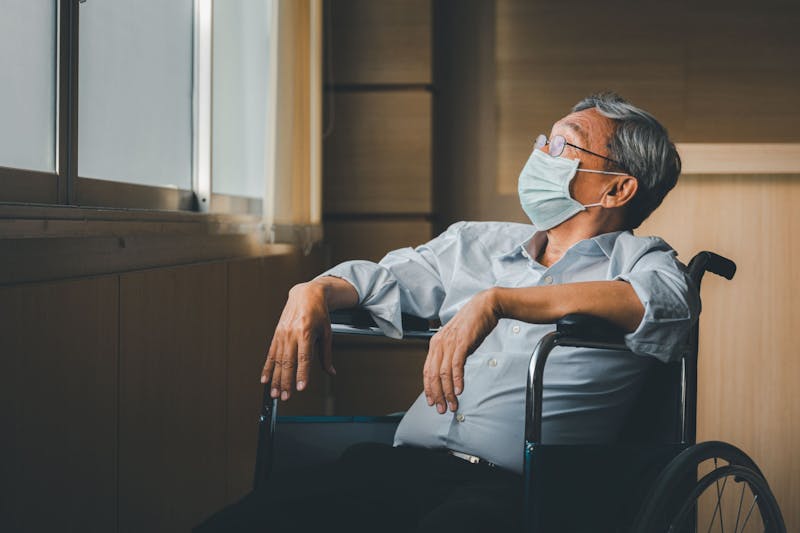
As COVID-19 continues its deadly assault in nursing homes, evidence is mounting that the virus’s death toll extends far beyond those who actually become infected. Grieving families are coming forward with their personal stories of how their loved ones escaped the virus ― but died horrible deaths from neglect ― as long-term care facilities struggle to keep up with the pandemic.
In a report published in mid-November, the Associated Press (AP) released the findings of a nursing home expert who analyzed data from the country’s 15,000 facilities at the news agency’s request. The expert estimated that for every two COVID-19 victims in long-term care, there is another victim who died prematurely of other causes.
Since March, there have been more than 40,000 “excess deaths” beyond the normal rate of fatalities in nursing homes, according to the AP. This represents roughly 15 percent more deaths than in a typical year.
When the expert compared mortality rates at facilities struck by COVID-19 with those that were spared, he found that the greater the rate of infection, the greater the number of deaths recorded for other reasons. For example, in facilities where at least three in 10 residents had the virus, the rate of death for reasons unrelated to the virus was double what would be expected without a pandemic.
The clear implication is that as nursing homes battle COVID-19, they are failing to provide necessary care to their vulnerable residents who are unable to care for themselves. The problem is compounded by the staffing shortages that often pre-existed the pandemic but worsened when workers tested positive or needed to quarantine. Indeed, according to data provided by the American Association of Retired Persons (AARP), for the four-week period ending on Oct. 18, 2020, in the U.S. there were 2.7 new confirmed nursing home staff cases of COVID-19 per 100 residents. For that same period, 27.6 percent of nursing homes had a shortage of direct-care workers, including nurses and aides.
What Are the Signs of Nursing Home Abuse and Neglect?
Signs of potential nursing home abuse and neglect include:
- Bruising
- Dehydration
- Malnutrition
- Poor Hygiene
- Infections
- Falls
- Broken Bones
- Pressure Sores/Bed Sores
- Mismanaged Diabetes
- Mismanaged Pain/Theft of Narcotic Medication
- Mismanaged Coumadin/Warfarin Therapy
The list, however, cannot begin to describe the immense suffering endured by seniors when nurses, nurse aides, doctors, and others responsible for their care essentially abandon them. The Associated Press detailed several tragedies involving nursing home residents who were lucky enough to avoid COVID-19, but died horrible deaths anyway. They include:
- A 75-year-old former truck driver who died after becoming so malnourished and dehydrated that his son described him as weighing 98 pounds and looking like he had been in a concentration camp. He also suffered from septic shock, which suggested an untreated urinary tract infection (UTI), and E. coli in his body from his own feces, which suggested poor hygiene. The former trucker, who needed help with meals, also had aspiration pneumonia, which indicated that he had likely choked on his food.
- An 83-year-old retired switchboard operator who prior to the pandemic enjoyed tai-chi classes and visits from a pony. Her daughter described her as going from being “unbelievably cared for to dead” in three weeks. The daughter recounted an alarming FaceTime call with her mother in which her eyes were closed, she moaned, flailed her arms above her head, and kept repeating “no.”
- A 78-year-old father whose daughter was barred from visiting him for three months. When she finally gained access, she found that the temperature of her dad’s room was 85 degrees, his sheets were soaked with sweat, and he was covered with bruises. His nails, which had not been cut, curled over his fingertips, and his eyes were crusted shut. Inside his diaper, his genitals were deep red and skin was sloughing off.
- An 87-year-old Army veteran, contractor and farmer who just prior to the pandemic had a check-up and lab work that made his daughter think that he would be with her for a long time. When the pandemic hit, her dad went so long without liquids and fluids that he was found unresponsive on the floor with his eyes rolled back and his tongue sticking out. He was taken to the hospital and died two weeks later of complications related to kidney failure.
How Common Is Nursing Home Neglect?
Even before the pandemic, nursing home neglect was a problem. A 2019 report by the U.S. Department of Health and Human Services, Office of Inspector General, estimates that in 2016, one in five high-risk hospital ER Medicare claims potentially resulted from the abuse or neglect of a resident in a skilled nursing facility. While the statistic is sad, it reflects normal times when dedicated family members could visit their loved ones frequently, help care for them, and be on the lookout for anything amiss.
But these aren’t normal times. With nursing homes mostly locked down to visitors since March, family members can no longer serve as the first line of defense against neglect. Even when relatives have stayed connected with their loved ones via technologies such as FaceTime, Zoom or Skype, there is only so much that can be gleaned from the screen of an electronic device. Relatives can’t see or smell poor hygiene, skin breakdowns or soiled sheets, to name some examples.
What Should I Do If I Believe My Loved One Was Injured or Killed from Nursing Home Neglect?
Andrew K. Mitnick, a partner at Feldman Shepherd Wohlgelernter Tanner Weinstock Dodig LLP, whose practice includes nursing home and long-term care facility neglect and abuse, said that nursing homes have a legal duty to properly care for all residents ― including those who don’t have COVID-19 ― and they cannot hide behind the extra demands created by the pandemic as an excuse for escaping responsibility when improper care is delivered.
“Unfortunately, what we frequently see is that the nursing home industry, rather than rising up to meet these challenges, has instead focused efforts on lobbying politicians to pass new laws that will prevent nursing homes from being sued and held accountable for abuse and neglect. Protecting profits, not patients, is simply intolerable.” Mitnick said.
Mitnick recommends contacting a nursing home and long-term care abuse attorney immediately if you believe your loved one has been seriously injured or killed by a nursing home’s inadequate care to ensure that the victim’s and family’s legal rights are protected.

